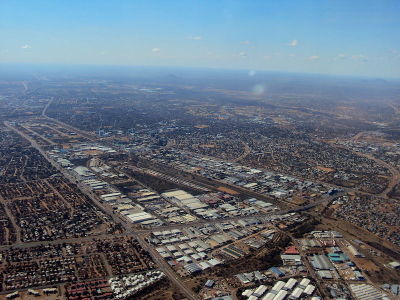Gynopedia needs your support! Please consider contributing content, translating a page, or making a donation today. With your support, we can sustain and expand the website. Gynopedia has no corporate sponsors or advertisers. Your support is crucial and deeply appreciated.
Gaborone
OVERVIEW
Contraception (Birth Control)
General Note: There are many types of contraceptives, also known as "birth control," including IUDs, oral contraceptives, patches, shots, and condoms, etc. If you would like to view a full list, click here.
Laws & Social Stigmas
In Botswana, you need a prescription to obtain oral contraceptives (birth control pills).[1]
What to Get & Where to Get It
Costs
Emergency Contraception (Morning After Pill)
Important Notes: Emergency contraception may prevent pregnancy for three days (72 hours) and sometimes five days (120 hours) after unprotected sex. Take EC as soon as possible after unprotected sex. If you don't have access to dedicated EC, oral contraceptives can be used as replacement EC, but remember the following: 1) Only some contraceptives work as EC 2) Different contraceptives require different dosages and time schedules to work as EC 3) You must only use the first 21 pills in 28-day packs and 4) They may be less effective than dedicated EC. For general information on emergency contraceptives, click here and here.
Laws & Social Stigmas
What to Get & Where to Get It
Note: The longest-lasting EC is currently ellaOne. It lasts up to 5 days (120 hours) after unprotected sex. Check to see if your country carries ellaOne. If your country doesn't carry ellaOne, copper IUDs may also prevent pregnancy up to 5 days after unprotected sex. If none of these options are available, and it's been over 3 days since you had unprotected sex, you can still take EC, which may work up to 5 days. Note that EC pills are not 100% effective and should be taken as soon as possible.
Costs
Sexually Transmitted Infections (STIs/STDs)
Important Notes - Learn about PEP and PrEP: If you think that you've been recently exposed to HIV (i.e. within 72 hours), seek out PEP (Post-Exposure Prophylaxis). It's a month-long treatment to prevent HIV infection after exposure, and it may be available in your city. Take PEP as soon as possible. For more information, click here. If you are at risk of HIV exposure, seek out PrEP (Pre-Exposure Prophylaxis). It's a daily oral pill that can prevent HIV infection before exposure. To learn more about PrEP, click here.
Laws & Social Stigmas
What to Get & Where to Get It
Testing Facilities
Support
Costs
Medications & Vaccines
Laws & Social Stigmas
What to Get & Where to Get It
Costs
Menstruation
Note: In addition to pads and tampons, you can also use menstrual cups and menstrual underwear for your period. To learn more about menstrual cups, click here. To learn more about menstrual underwear, click here.
Laws & Social Stigmas
What to Get & Where to Get It
Costs
Gynecological Exams
Laws & Social Stigmas
What to Get & Where to Get It
- Dr Lyno @ Bokamoso Private Hospital: This ob/gyn was recommended by a local of Gaborone.
- Susanne Conopio @ Bokamoso Private Hospital: "She is very nice and patient" (from a Gaborone local). An examination should cost around around 500 pula.
- Princess Marina Hospital Tel: 362 1400
Costs
Pregnancy
Laws & Social Stigmas
What to Get & Where to Get It
Costs
Abortion
Important Note: There are two main types of abortions: medical (also known as the "abortion pill") and surgical (also known as "in-clinic"). For medical abortions, you take a pill to induce abortion. For surgical abortions, a procedure is performed to induce abortion. For general information about medical and surgical abortions, click here.
Laws & Social Stigmas
What to Get & Where to Get It
Costs
Advocacy & Counseling
Laws & Social Stigmas
What to Get & Where to Get It
- Kagisano Society Women's Shelter (KSWS): "The Kagisano Society Women’s Shelter (KSWS) is a non-profit organisation which aims to raise awareness about gender-based violence in Botswana. It is the first and one of the only two shelters in Botswana that are a refuge for women survivors of Gender Based Violence and their children." Physical Address: Plot 6062/3 Extension 19 Broadhurst, Gaborone. Postal Address: Private Bag X046, Gaborone Botswana. Tel: +267 3907659. Mobile: +267 74 265 081. Fax number: +267 3908691.
Costs
List of Additional Resources
- Click here to learn about LGBT laws in Botswana. Note that homosexuality is illegal in Botswana, as of February 2018.
- Ministry Of Health & Wellness, Botswana: Address: Nelson Mandela Dr, Gaborone, Botswana. Phone: +267 363 2500.
- Gender Links - Botswana: "Formed in March 2001, Gender Links (GL) is a Southern African NGO, headquartered in Johannesburg, South Africa that promotes gender equality and justice..." Email: botsmanager@genderlinks.org.za
- Men & Boys for Gender Equality: "A Botswana based NGO that engages men and boys to reduce gender inequalities, GBV, prevent HIV and promote health & well being of Women, Men and Children." Email: desmondlunga@gmail.com
- MenEngage Botswana: "MenEngage Botswana is a network of NGOs that advocate around a number of key issues where gender directly affects the lives of women and men. The network was formed in September 2014 and is hosted by the office of Men and Boys for Gender Equality (MBGE)." Tel: +267 395 7763
